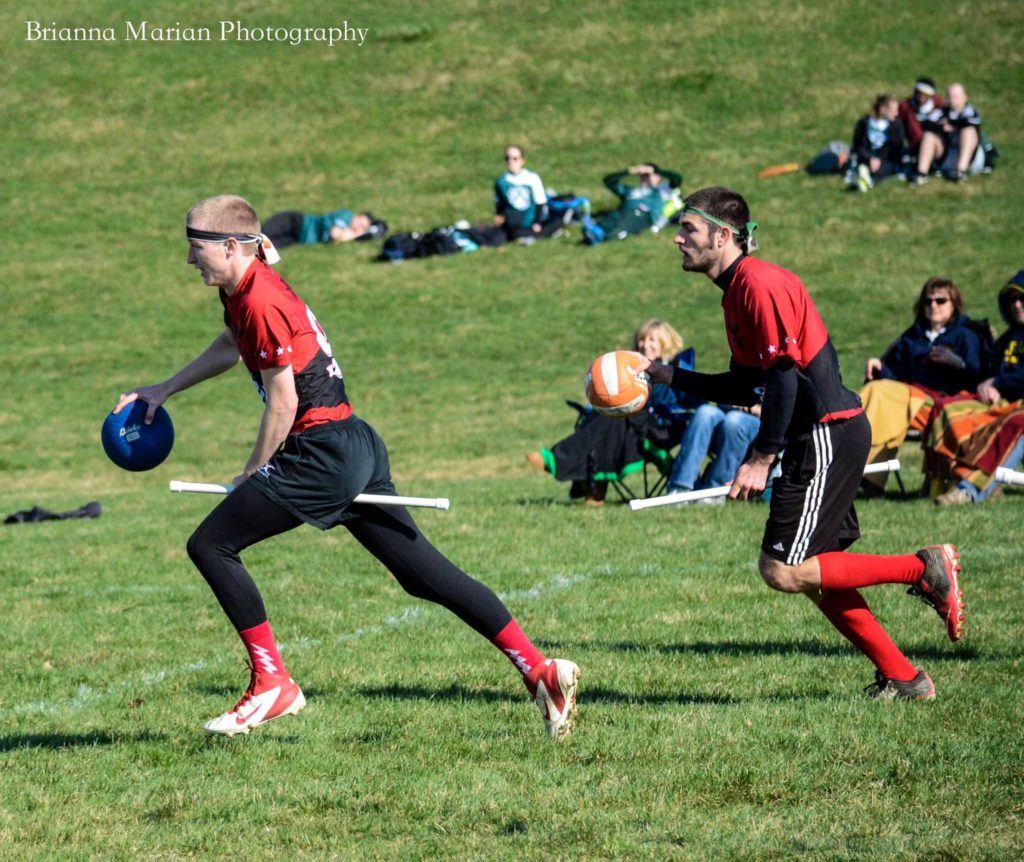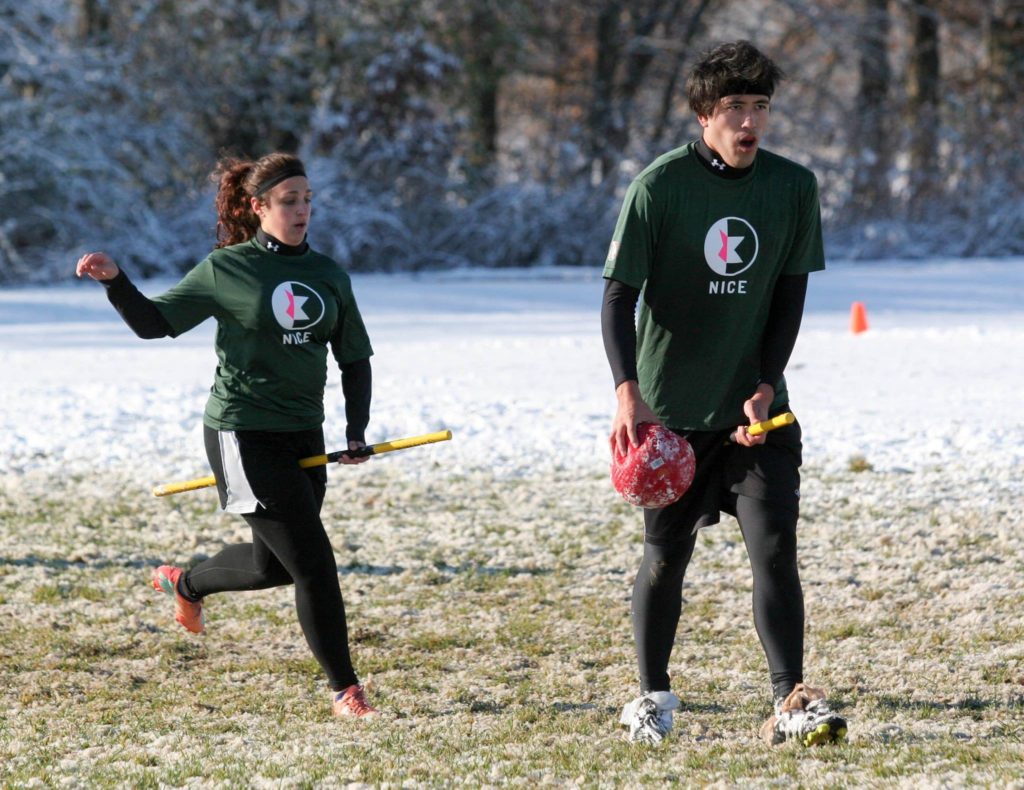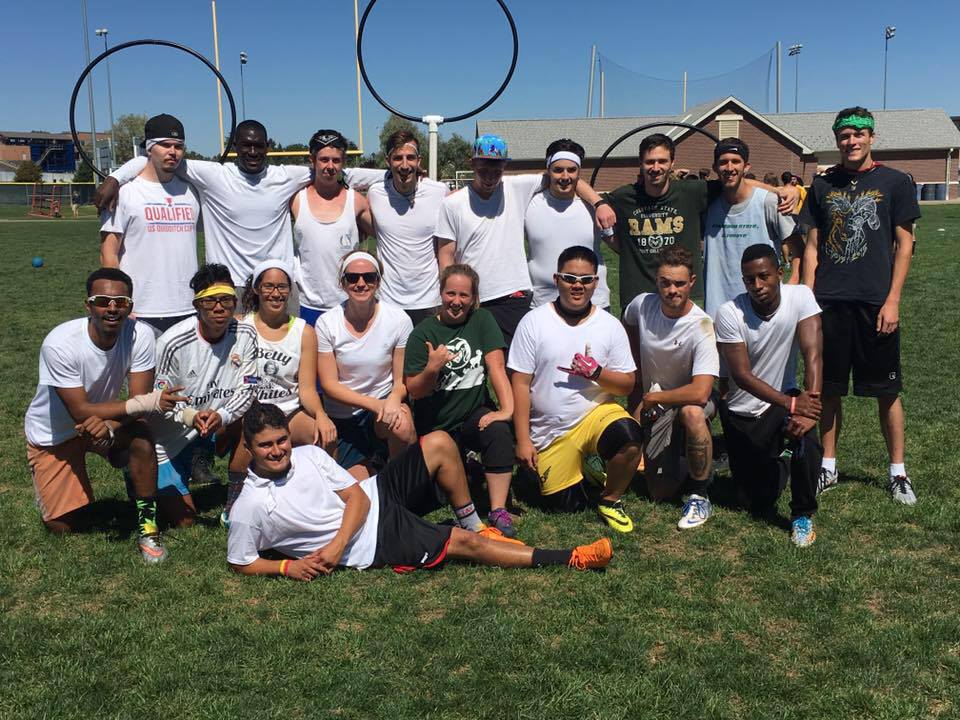Antwerp QC, Much of Belgian Core, Leaves Competitive Quidditch

Credit: Brianna Marian Photography
With a new season upon us, the staff of The Eighth Man got together and identified key storylines in each region. Staffers then were assigned a side in favor or against each statement. This is the third installment in our Pick a Side series: the Midwest.
Kansas and Minnesota Will Not Qualify For Nationals
Against: Eric Wasser – Great Lakes Correspondent
Frankly, this region isn’t deep enough for this to hold true.
With the members of Minnesota Nice folding into TC Frost—an almost inevitable championship-winning squad—there is essentially one free pass to Kissimmee for University of Kansas and University of Minnesota to fight over.
It’s very apparent that Illinois State University, claiming Team-USA-elect seeker Jeff Siwek and the largely-improved Colin Richards, is the only competition Frost has for the regional gold (barring another blizzard that makes skill and passing useless). There should be at least one spot for either Kansas or Minnesota, unless the region only gets two bids. Chicago Phoenix isn’t going to threaten either team in any way and it’s highly unlikely any Colorado team will either. That leaves Marquette University—who hasn’t attended nationals since the days when RIT could beat Quidditch Club Boston—and, maybe, University of Missouri to be established enough to compete for a potential third or fourth bid. Those who are betting against qualifications for Kansas and Minnesota are really betting on a deep Midwest Regional Championship, which just seems silly.
For the sake of clarity, if the Midwest was to receive one less bid than last year—which seems likely—then three-fourths of regional semifinalists would qualify for nationals. If the seeding shakes out equivalent to preseason speculation about team skill, then Illinois State and Frost will be across the bracket from one another in the top seeds with Kansas and Minnesota in the third and fourth positions. Sure, one of these teams may get upset in quarterfinals, but I find it highly unlikely that both would fail to make the semifinals. I find it even less likely that neither will win a consolation/qualification game, especially considering the extra practice and heightened level of competitiveness garnered by many Kansas players on MLQ’s Kansas City Stampede. If the region receives four more bids, it’s nearly impossible for both teams to fail to qualify.
For: Tyler Walker – Managerial Editor
Two of the Midwest’s oldest programs—Kansas and Minnesota—will fail to qualify for a bid to the big dance for the first time.
The two programs are very different in playstyle, history and many other factors, but they hold a lot of similarities as to why they won’t qualify: The new college requirements, a strengthened Frost and the overall increase in regional parity do not help either team’s chance to qualify.
With a constantly crowding Midwest field, teams who want to ensure a national bid will have to create separation. The new college verification process means that neither Kansas nor Minnesota will be able to fall back onto past alumni or community members for help. With a fall tournament date, regional success will come down to having experienced players on the roster. While both teams boast returners, they will not be able to separate themselves from the pack by filling their rosters with graduates like Hai Nguyen or Cody Narveson.
Meanwhile Illinois State is coming off the best season in the program’s history with their signature wins against UNC and Kansas. The team is on an upward trajectory due to few players graduating and returners spending their summer playing in MLQ. Missouri is in the same boat, returning after a solid season where they were rarely pushed out of range. The consistent performance last year—paired with the best beater in the region, David Becker—makes this team poised to compete for a regional title. Marquette—one of the two teams who were able to put Missouri out of range—can also be considered a contender. While the team did not earn a national bid, it is no fluke that they ended the season with the highest USQ ranking in the Midwest. Marquette’s only losses in-region came at the hands of Missouri at their regional. They showed the country how good they could be at Consolation Cup losing in-range to UTSA in the semifinals.
Frost combining with Nice gives the Midwest its first serious community contender. Both teams showed dedication last season after they did not qualify and the combination of Frost’s athleticism with Nice’s strategy make a regional championship contender. The state of Colorado seems poised to enter into the discussion as well. Mile High Quidditch Club is comprised of veteran players from across the country. University of Northern Colorado has the physicality to match both Kansas and Minnesota and, if they can gain more strategy, will be able to push the two programs. And if the rumored Kansas City community team comes to fruition, that could mean at least nine teams legitimately vying for regional bids.
That amount of parity means there will be close games. Typically that would be a blessing for Kansas, but that may not be the case anymore. Kansas was 4-5 in snitch-range games last year. This year, they will not have Kier Rudolph in those situations, and unless they can train a new star seeker soon, they could be in trouble. Minnesota, on the other hand, was 5-3, but clearly faded in the second half of the year, losing to both Gulf Coast Gumbeaux and Quidditch Club Boston out of range and failing to make bracket play at nationals.
For the first time, neither Kansas nor Minnesota comes into the season as the clear favorite. Both will need to prove themselves as legitimate contenders not just on a national scale but in their own region as well.
TC Frost Will Keep the Regional Title in Minnesota
Against: Tyler Walker – Managerial Editor
Frost is a team composed of veterans. They have athletic quaffle players, experienced beaters and dedication, but they will not keep the Midwest Regional Championship title in the city of Minneapolis. They will fail for the same reason they were forced to come together: The team is split in philosophy of how to play quidditch. It is the reason that, despite a community team already in the same city, Narveson and Josh Zemke decided to form Nice.

Credit: Matt Dwyer
On paper, the team looks great. That is nice in theory, but sports aren’t played in theory. If they were, the Lost Boys would probably have a national championship right now. While this team does not have anywhere near the amount of internal drama or sheer talent as the team from Los Angeles, there was still a reason they were separate teams last season.
Frost, in the past, ran on offense and used their physicality to make stops on defense. Bludger control was not as important as setting the pace of the game with the quaffle play. Nice, on the other hand, liked to slow down on offense and wait to get bludger control before attacking. Their game was more heavily based on bludger play.
The 2016-17 rendition of Frost is a team that will succeed. They are too good to struggle against lower-tiered teams and in those easy games they will not need chemistry and synergy to excel. But, when they are finally tested, the cracks will start to form. When they are kept in snitch range during brackets, the differing mindsets will start to test each other. While the team is unified enough in its goal to qualify as the first community team in the Midwest, they both want to do it their own way.
For: Austin Pitts – Midwest Correspondent
With the addition of Nice players, Frost has become the team to beat in the Midwest.
Experience, chemistry and athleticism all give Frost a clear advantage in nearly every matchup that could arise within the Midwest. In a region with a very muddled hierarchy near the top, there’s no reason to believe that Frost won’t secure the regional title come November.
For the past few years, Frost has boasted a strong chaser corps, with some of the best athletes in the region. Matthew Bessard, Andrew Wagganer and Alexander Obanor are all huge threats with the quaffle in their hands. The main reasons for their lack of success were deficiencies in the beating game along with a lack of cohesion and general strategy within the team. Both of those issues were addressed with the Nice additions, as Zemke and Taylor Zastrow look to lead the Frost beater line while Narveson shores up the overall strategic mindset of the team moving forward.
In terms of strategy, Frost will come in with an advantage over college teams with the chemistry not only between original Frost players but also between former players from Minnesota. This chemistry should be evident especially in the team’s defense, particularly if they choose run to a hoop zone, as they have done in the past. Young teams that haven’t had to face a hoop zone before the Midwest Regional Championship will run into cohesion and timing issues. For teams that are more prepared for the zone and can keep games close, Frost rolls with Max Meier and Luke Zak at seeker. Being able to throw different looks at snitches means Frost will go into most snitch-range games at a clear advantage over teams in the region. With a revamped beating game and the best overall athletes the region has to offer, the Midwest Regional Championship is Frost’s to lose.
The State of Colorado Will Produce Contenders
Against: Austin Pitts – Midwest Correspondent
After a quiet inaugural season in its new region, Colorado looks to push itself to the forefront of the conversation about contenders in the Midwest and the rest of the country as a whole. Unfortunately, the odds of doing that remain low for the upcoming year.
University of Northern Colorado was a team that surprised at last year’s regional championship and Spring Breakout. While lacking stars, they were a physical team and played well together. However, that physicality is in large part a result of short fuses and results in illegal contact. Not only did Northern Colorado show off physicality on both sides of the ball, but they also showed off their collective temper and a shallow understanding of the rules. At both their regional and Spring Breakout, multiple players for Northern Colorado were carded for illegal contact and proceeded to blow up on the refs. The arguments would come even on blatantly illegal plays and the same types of fouls continued after similar cards. Northern Colorado flashed potential at various points but, without a severe overhaul of their leadership to keep them in line, they do not seem poised to take the next step.

Courtesy: Abby Hegarty
The other Colorado team of note, Mile High, looks to bring together pieces from around the league. Local talent like De’Vaughn Gamlin will be partnered with regional transplants such as Chris Beck from Texas A&M, Abby Hegarty from University of Richmond and Jensen Morgan from Crimson Elite to provide a solid base to start the season. However, the lack of experience before the Midwest Regional Championship will be a problem for Mile High. Outside of the Northern Colorado squad, Mile High has some of the furthest drives to get to any tournaments. For a first-year community team that is trying to find its identity, lack of consistent competition will be an issue. While Mile High will most likely have an advantage over college teams early purely due to experience levels, that experience won’t be able to carry them through the entire semester as college teams gain playing time and develop chemistry together. Unless Mile High can consistently practice together and make the trek to multiple tournaments before their regional, the state of Colorado will have to wait even longer to make the jump to the top of the region.
For: Tyler Walker – Managerial Editor
The state of Colorado has never had a team qualify for a national tournament. Without having teams at the biggest schools or NCAA Division I schools in the state, it makes some sense why consistently competitive quidditch hasn’t been fostered. This year may not see the first Colorado team playing in Kissimmee, but it will witness two vastly different—but competent—teams that will throw themselves into a crowded Midwest field. Both are looking to play against tough competition early in the season and give the rest of the region very different looks.
Northern Colorado went just 5-16 last season. From those 16 losses, 10 came against teams who qualified for nationals. From the other six, five ended in snitch range. Only Nice was able to put Northern Colorado out of range. This shows two things: Northern Colorado beat the teams they were supposed to and they gained a lot of experience last season.
Objectively, Northern Colorado is a team with physicality that can keep up with any team in the Midwest. The problem is that they are not as refined as they need to be, and frequently the team will take itself out of games by getting carded. While they were able to beat the less-skilled teams last season, they would be able to compete at a higher level if they just clean up their game and learn to use their physicality to their advantage.
Along with playing against solid competition last season, they also got experience playing in a variety of regions. They were able to play official games against the West, Southwest, Northwest and Midwest. If they were able to pull from those experiences, they will be able to give teams in the Midwest new looks. All this team needs to do to succeed is take the experience from last season and tighten up their game; if they do that, they can compete against anyone in the region.
Mile High looks to start their inception by replicating the out-of-region schedule Northern Colorado had last season. Both will compete in Crimson Cup lll against national qualifiers from other regions like Crimson Elite, Northern Arizona University, Utah State University and Northwest Regional Champion Boise State University. Taking advantage of their location will be a huge asset to this first-year community team. Along with playing various regions, their team is built around players from numerous teams across the country: Texas A&M, Richmond, RPI, Lock Haven University and Crimson Elite. This will bring a large amount of experience, varying strategies and looks. If they mesh well and trust each other, they will be able to fight their way out of many tough games at the regional championship.
The state of Colorado is ready for its showcase.
Archives by Month:
- May 2023
- April 2023
- April 2022
- January 2021
- October 2020
- September 2020
- July 2020
- May 2020
- April 2020
- March 2020
- February 2020
- January 2020
- December 2019
- November 2019
- October 2019
- August 2019
- April 2019
- March 2019
- February 2019
- January 2019
- November 2018
- October 2018
- September 2018
- August 2018
- July 2018
- June 2018
- April 2018
- March 2018
- February 2018
- January 2018
- November 2017
- October 2017
- July 2017
- June 2017
- May 2017
- April 2017
- March 2017
- February 2017
- January 2017
- December 2016
- November 2016
- October 2016
- September 2016
- August 2016
- July 2016
- June 2016
- May 2016
- April 2016
- March 2016
- February 2016
- January 2016
- December 2015
- November 2015
- October 2015
- September 2015
- August 2015
- July 2015
- June 2015
- May 2015
- April 2015
- March 2015
- February 2015
- January 2015
- December 2014
- November 2014
- October 2014
- September 2014
- August 2014
- July 2014
- May 2014
- April 2014
- March 2014
- February 2014
- January 2014
- November 2013
- October 2013
- September 2013
- August 2013
- July 2013
- June 2013
- May 2013
- April 2013
- March 2013
- February 2013
- January 2013
- December 2012
- November 2012
- October 2012
Archives by Subject:
- Categories
- Awards
- College/Community Split
- Column
- Community Teams
- Countdown to Columbia
- DIY
- Drills
- Elo Rankings
- Fantasy Fantasy Tournaments
- Game & Tournament Reports
- General
- History Of
- International
- IQA World Cup
- Major League Quidditch
- March Madness
- Matches of the Decade
- Monday Water Cooler
- News
- Positional Strategy
- Press Release
- Profiles
- Quidditch Australia
- Rankings Wrap-Up
- Referees
- Rock Hill Roll Call
- Rules and Policy
- Statistic
- Strategy
- Team Management
- Team USA
- The Pitch
- The Quidditch Lens
- Top 10 College
- Top 10 Community
- Top 20
- Uncategorized
- US Quarantine Cup
- US Quidditch Cup
